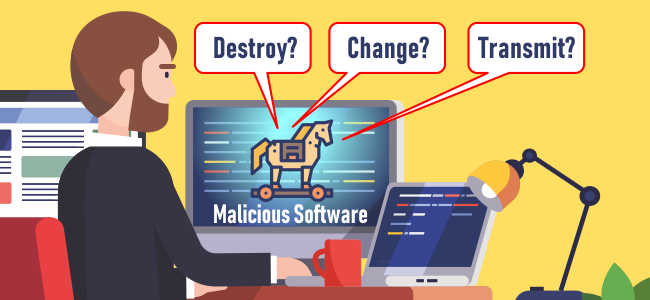A Trojan horse is a kind of malware that is concealed to look more like an authorized software. Hackers create trojan codes to establish a connection to the victim’s system and gain illegal access to data without the user’s consent. Most often hackers trick the victim users through social media engineering practices to install and run Trojans in the infected system.

The hackers, therefore create a backdoor entry to gain remote access from malicious system to the infected system. By this way, the cyber-thieves can spy on the activities of the victim’s system and reach out to user’s sensitive data. With Trojans, hackers can delete, alter, block, and copy data. Trojan horse virus can also allow the hackers to interfere with the system performance causing disruption and Blue Screen of Deaths. However, Trojans are not meant to self-replicate like viruses and computer worms.
Modus Operandi of Trojan Horses
Trojans are malicious codes that are developed and installed by the hacker onto the vulnerable applications, programs or files. Once the Trojans are installed, they intend to infect the other files associated with the victim’s system. The malware author is also capable of gathering important sensitive information from the infected system and manages to take control over the complete functioning of the system causing system crash.
Malware authors find ways to convince users to download the Trojan mostly through phishing mails. Once the program is executed, the Trojan server gets installed and starts to run instantly as and when the system power is turned on.
Different Types of Trojan Horses
The Trojans are categorized into different types as per the action involved in targeting and infecting the victim.
- Rootkit: These types of Trojan horses are developed to hide the system activities in your system. The key objective of rootkits is to escape detection by the users and therefore enable a longer period of stay and cause more infection on the target system.
- Backdoor Trojan: This type of Trojan creates a backdoor to the victim computer to establish connection with system hosting the malware. This empowers the hacker to take control of the victim’s system from remote and monitor the activities involved in the system. It also helps to download sensitive data by any third-party programs and can cause data or identity theft.
- DDoS attack Trojan: This type of Trojan can do DDoS attacks also called Distributed Denial of Service Attacks. This type of attack floods the network with a heavy flow of unwanted and suspicious traffic that comes from an infected system.
- Downloader Trojan: This type of trojan downloads the malware content into a system that has been already infected.
- Fake Antivirus Trojan: Malware authors design and develop this type of trojan to function more like an antivirus software. However, it requests the user to pay a sum of money to remove the identified threats.
- Ransom Trojan: This type of Trojan is created to steal or encrypt files and deny the user to access the encrypted files as well. The malicious author demands a huge payment to be made by the user to decrypt and render back the stolen files.
- Infostealer Trojan: This is designed and developed to extract all the data from your infected system.
- Remote Access Trojan: This is a type of Trojan used by hackers to take control of the victim’s computer from remote. It is more commonly used to spy on the target users’ activities.
- Mailfinder Trojan: This type of trojan infects the system and searches to find email addresses that have been archived on the device.
- Trojan banker: The key objective of this type of trojan is to steal bank-related documents like account balance statements, latest transactions and all the records related to target users’ bank accounts.
Prevail with Prevention
Implement best security practices to prevent any kind of Trojan attacks
- Ensure that the operating system software is up-to-date; as outdated software is vulnerable to security attacks. It is also critical to ensure that the other software installed in the system are up-to-date with the latest patch fixes released by the software vendors.
- Ensure to implement scheduled scans on a regular basis to check if there are traces of malware infection. Automate the scanning process at defined regular intervals.
- Install an effective security suite system like Comodo Antivirus that combines the best security features like Default Deny protection, auto sandboxing technology, tailor-made protection, cloud-based antivirus, spyware scanning, cloud-based whitelisting and more customized alerts.
- Incorporate the use of unique and complex passwords.
- Be wary of suspicious email attachments. Ensure to scan the email attachments first, before opening the attachment.
How to stay safe from Trojans
Install an effective antivirus software such as Comodo Antivirus to deliver instant protection to laptops, Macs, tablets, smartphones and PCs from Trojan-based attacks. Comodo Antivirus products are available to secure Windows devices, Android Mobiles, Linux devices and iOS devices. For more information on Comodo Android Antivirus, visit our official page.
Related Resource




